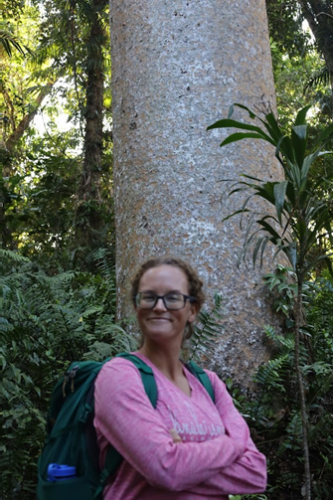 Jen Green spent part of August 2023 traveling to Cairns, Australia to facilitate an organized session at the International Council for Archaeozoology—a global meeting of archaeologists who specialize in the study of animal remains from archaeological sites. The session was part of a National Science Foundation FAIROS RCN (Findable Accessible Interoperable Reusable Open Science Research Coordination Network) (Award # 2226370) award granted to Drs. Michelle LeFebvre (FLMNH), Kitty Emery (FLMNH), and Suzanne Pilaar-Birch (UGA). The RCN aims to provide disciplinary improvements for research on past global changes and to create exchange networks and training opportunities to connect data systems and the practitioners who utilize them. The crux is to ensure that archaeologists, data scientists, paleontologists, biologists, and interdisciplinary researchers of all kinds can collect, analyze, and share FAIR (Findable, Accessible, Interoperable, Reusable) data. In doing so, the workshop supports the need for CARE principles to be integrated into data science. Collective benefit-Authority to control-Responsibility-Ethics are the core principles for indigenous data governance and illuminate global indigenous perspectives in the growing needs for data governance across scientific disciplines. The workshop was a great addition to the conference, and attendance was high. Students, young professionals, academics, and practitioners from all over the globe participated in round-table groups to brainstorm ways in which the RCN could assist the field of zooarchaeology. Specifically, the discussions involved how the field can encourage and facilitate ethical open data practices (FAIR and CARE practices) in the discipline and inquired about the types of resources needed for people at various stages of their careers or at varying institution types.
Jen Green spent part of August 2023 traveling to Cairns, Australia to facilitate an organized session at the International Council for Archaeozoology—a global meeting of archaeologists who specialize in the study of animal remains from archaeological sites. The session was part of a National Science Foundation FAIROS RCN (Findable Accessible Interoperable Reusable Open Science Research Coordination Network) (Award # 2226370) award granted to Drs. Michelle LeFebvre (FLMNH), Kitty Emery (FLMNH), and Suzanne Pilaar-Birch (UGA). The RCN aims to provide disciplinary improvements for research on past global changes and to create exchange networks and training opportunities to connect data systems and the practitioners who utilize them. The crux is to ensure that archaeologists, data scientists, paleontologists, biologists, and interdisciplinary researchers of all kinds can collect, analyze, and share FAIR (Findable, Accessible, Interoperable, Reusable) data. In doing so, the workshop supports the need for CARE principles to be integrated into data science. Collective benefit-Authority to control-Responsibility-Ethics are the core principles for indigenous data governance and illuminate global indigenous perspectives in the growing needs for data governance across scientific disciplines. The workshop was a great addition to the conference, and attendance was high. Students, young professionals, academics, and practitioners from all over the globe participated in round-table groups to brainstorm ways in which the RCN could assist the field of zooarchaeology. Specifically, the discussions involved how the field can encourage and facilitate ethical open data practices (FAIR and CARE practices) in the discipline and inquired about the types of resources needed for people at various stages of their careers or at varying institution types.
Jennifer Green is a Collection Manager of South Florida Archaeology and Ethnography at the Florida Museum of Natural History.
The CMSS 2023 Summer Travel Awards are funded with the support of the FLMNH Directors Office and the Department of Natural History.